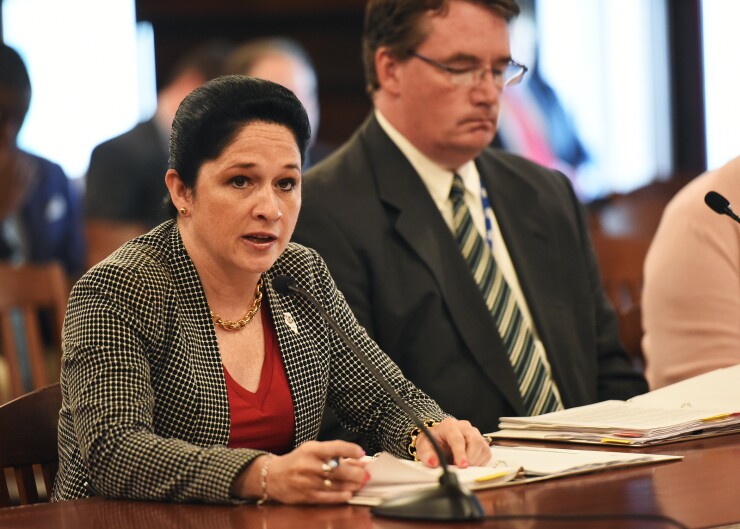CHICAGO – A fiscally distressed Chicago suburb is slashing its public safety staff after the state acted for the first time under a 2016 law to withhold funds for past pension funding shortages.
Harvey Mayor Eric Kellogg called an emergency council meeting Monday and the city on Tuesday said deep cuts would be needed that will trim about one-quarter of sworn officers and nearly one-half of firefighters from city payroll to offset the diversion of about $1.4 million in state-collected funds.
Kellogg blamed state Comptroller Susana Mendoza for making “an unprecedented illegal move to freeze our dollars.”
The budget crisis is the latest in a series of black marks for the city south of Chicago that has already been tarnished by bond defaults and federal sanctions for misleading bondholders.
The current crisis dates back to a $7.3 million police pension funding judgment from 2015 that was upheld by the appellate court last year. Pressures have accelerated in recent days as the state has withheld funds it collects – such as sales taxes – and then distributes to local governments.
A judge rejected an emergency motion by Harvey Monday to free up the cash.
It’s the first time the pension funding provision was triggered under 2016 legislation. Harvey’s distress underscores the difficulty of balancing funding for local services with pension requirements and the lack of state intervention for struggling municipalities, a local government research organization said.

The police fund notified Mendoza’s office earlier this year that it was owed $7 million based on the prior court judgment.
The local government can respond, which Harvey did, laying out several arguments against the withholding, including its position that payments were not overdue and would be made through future tax levies.
The pension fund dismissed the arguments. “The amounts claimed in the collection request are for contributions based on levies the city promised but failed to make years ago, and which the courts have determined, in a final and enforceable judgment, are owed to the pension fund,” the fund wrote.
Harvey went to court Monday seeking to free up the funds but the court sided with the fund’s position. The city warned in court documents of the “catastrophic” impact if the revenue was not freed up.
“The comptroller’s office does not want to see any Harvey employees harmed or any Harvey residents put at risk, but the law does not give the comptroller discretion in this case,” Mendoza spokesman Abdon Pallasch said. “This dispute is between the retired Harvey police officers’ pension fund and the city of Harvey.”
The office has not yet sent payments to the pension fund and Pallasch suggested Harvey negotiate with the pension fund and agree on an amount the office can release for the town to make payroll.
Harvey’s public safety pension woes run deep. An Illinois appellate court in August upheld a trial court decision from 2015 ordering Harvey to levy a property tax to meet its firefighter pension fund obligations. The appeals court concluded the fund is on the verge of default in a first-of-its-kind finding by an Illinois court.
The city owes $11 million under that judgment.
The latest stress illustrates the city’s fiscal ills and mismanagement. The city settled Securities and Exchange charges that it misled bond investors by diverting proceeds away from projects for which they were intended. The complaint was notable in that it marked the first instance of the SEC getting an emergency court order to halt a pending bond sale. In 2016, Kellogg agreed to pay $10,000 and to never participate in a municipal bond offering again in order to settle charges he helped the city mislead bond investors.
The city recently has lost control of its water finances for mismanagement of funds and has defaulted on some bond payments.
While Harvey’s mismanagement can be laid on its own doorstep, the city’s strains underscore the need for state action. The local pension funding crisis has been driven in large part by state statutes that govern contributions and benefits and there’s “no clear path or process” to address the strains, said Laurence Msall, president of the Chicago Civic Federation, an independent government research organization.
The state “needs to step up” and exercise its “constitutional and legal authority” to protect Harvey residents and, if other similar cases arise, citizens of those communities, Msall said.
Several legislative proposals could help, Msall said. They include an Illinois Municipal League proposal to consolidate downstate and suburban public safety funds and a Civic Federation proposal to establish a special authority that would guide troubled local units of government through fiscal difficulties.
Msall doesn’t advocate in a change to the 2016 law that allows for the diversion of funds as it’s drawing much-needed attention to Harvey’s crisis before its pension assets are fully exhausted.
With public safety pension funding woes weighing on local governments across the state, other municipalities could face similar rulings and revenue withholdings down the line. Of the 649 public safety plans in the state, about 27 had funded ratios below 25%, Moody’s Investors Service reported.
Moody’s, which doesn't rate Harvey, said in a report this year that the Harvey firefighters opinion could pit pensioners against general obligation bondholders.
The city’s balance sheet is deep in the red. It reported an available operating fund balance of negative $51.6 million in fiscal 2016 and it has $43 million of debt and an adjusted net pension liability, based on Moody’s calculations, of $87.3 million, which equates to 3.6 times operating revenue.
Harvey last carried a rating of B from Fitch Ratings. Fitch withdrew the rating in November 2010 “due to insufficient information provided.” Harvey has a poverty rate of 36.4%, compared with the national rate of 15.5%.





